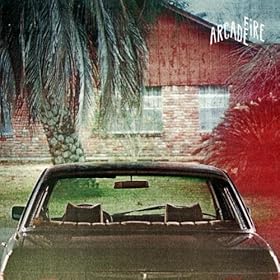
The Suburbs is about bedrooms, backyards, driveways, and parking lots; the places where dreams materialize in the heart of youth. But then communities dissolve, relationships disintegrate, and dreams dissipate, leaving disenfranchised kids roaming empty streets and cities, seeking solace, looking for home.
Arcade Fire's third album is a thrilling triumph that embraces the possibility of light in the throes of darkness, of love in the final acts of modern man. Less heavyhanded than Neon Bible, the album still possesses an underlying sense of despair, but it never detracts from the invitation to escape, and never weighs down the propulsive guitar-rock that carries much of the album. Indeed, the music's white-noise nostalgia is continuously interrupted by lyrical hooks, anthemic choruses, and bursts of clarity, in what may be seen as the band's first rock album, with their vibrant instrumental flourishes still in tow.
This is the Canadian band's The Joshua Tree--epic, righteous, guitar-driven, fervent--complete with massive anthems and soul-wrenching examinations. Unlike that album's wide-lens view of America and our inner soul, however, The Suburbs plays out more like Darkness at the Edge of Town, shrouded in a relentless future, uncertain of whether an appeal to our collective greatness will be fruitful.
The Suburbs' seamless majesty--both sonic and thematic--is an impressive achievement made possible by the band's considerable talents and willingness to reach for greatness. Will Butler referred to Arcade Fire as "a Moby-Dick kind of band." This is an apt description, as the collective's ambition goes for epic and achieves that kind of feeling, no matter the flaws. Rather than capturing merely small or limited moments (which it does to great effect), The Suburbs is a soaring depiction of visions past and future: childhood dreams give way as the adult world emerges, and the album's end-of-days philosophical exploration sears into the pysche. Over the arc of sixteen tracks, the album moves through the beauty, strangeness, and bittersweetness of youth, and often views those moments through the lens of an adult grappling with current crisis. This is not a short story with an easy ending.
The Suburbs is also that rare artistic creature: an accessible and aesthetic achievement that entered into the mainstream. Like Grizzly Bear's Veckatimest from 2009, The Suburbs reached #1 on the Billboard charts, if but for a brief stay, which is an impressive feat for an album that is such a heavy, conceptual thing.
But maybe that should not come as a surprise since The Suburbs' grand statement, however conflicted, seems so universal. After all, we are, in the end, talking about kids. Seeking fulfillment of the promises of youth. Seeking for connection long since abandoned: brothers, sisters, friends, hopes, dreams. Seeking for innocence, purity, goodness. Kids just like you and me.

No comments:
Post a Comment